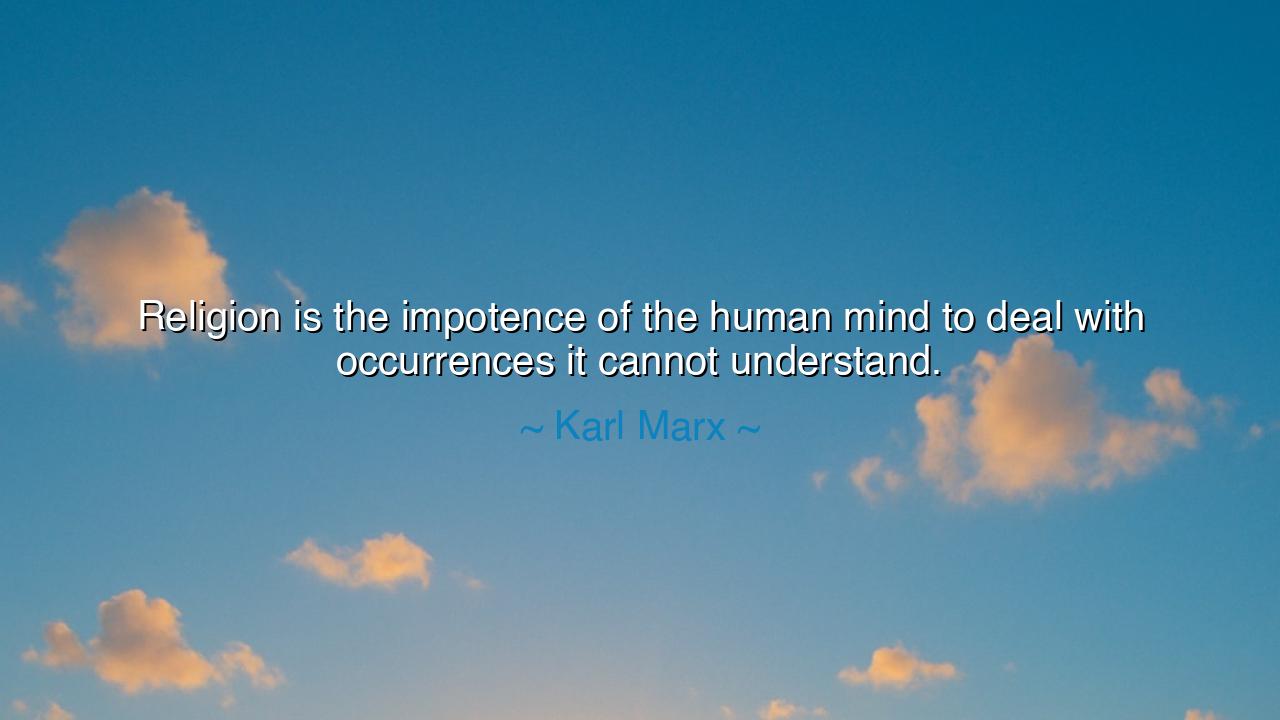
Religion is the impotence of the human mind to deal with
Religion is the impotence of the human mind to deal with occurrences it cannot understand.






"Religion is the impotence of the human mind to deal with occurrences it cannot understand." These powerful words by Karl Marx evoke a challenging and provocative perspective on religion. Marx's assertion cuts to the heart of his materialist worldview—he viewed religion not as a true answer to life’s mysteries, but as a crutch for the human mind in its struggle to make sense of an often chaotic and unexplainable world. For Marx, religion arose out of human helplessness, a response to the ineffable aspects of life that cannot be fully grasped by human reason or experience. It was, in his view, a form of impotence—an attempt to explain the world when the mind itself could not provide sufficient answers or explanations.
In the ancient world, philosophers and thinkers grappled with similar questions about the nature of religion and the human mind. Socrates, for example, believed that the human pursuit of wisdom and knowledge should be grounded in reason and rational thought, not in the acceptance of myths or divine intervention. He famously questioned the gods of Athens, searching for deeper, more logical explanations of existence, rather than attributing unexplained phenomena to the whims of deities. Socrates’ rejection of conventional religious beliefs in favor of reason foreshadows Marx's critique of religion as a tool of control, one that stifles the intellectual and spiritual potential of human beings by relying on unprovable beliefs.
The mysteries of life, death, and suffering have always stirred deep emotional and intellectual responses in humans. In medieval Christianity, for example, the Church provided explanations for the suffering of the poor and the afflicted. The promise of eternal life was a powerful comfort for those experiencing the harsh realities of medieval existence—disease, poverty, and war. Religion thus served as an explanation for the inexplicable: suffering was part of God's will, and the faithful would be rewarded in the afterlife. Marx, however, would view this as a distraction from the real problem: the material conditions of existence, particularly the economic systems that perpetuated inequality and oppression. To him, religion was a tool that served to placate the masses, preventing them from recognizing the true causes of their suffering and the potential for revolution to change their circumstances.
This criticism of religion as a tool of oppression is evident throughout Marx’s works. He famously wrote in his Critique of Hegel's Philosophy of Right that religion is the opium of the people—an allusion to the way religion dulls the pain of exploitation and inequality, keeping the oppressed in a state of passivity and submissiveness. Marx viewed religion as a false consciousness, a way for the ruling classes to maintain control by offering illusory comfort rather than the possibility of true liberation. Religion, then, was not just a response to human impotence in the face of the unknown; it was also a way to maintain the status quo, offering a way to understand life’s injustices






AAdministratorAdministrator
Welcome, honored guests. Please leave a comment, we will respond soon